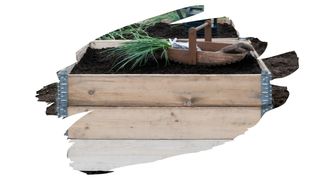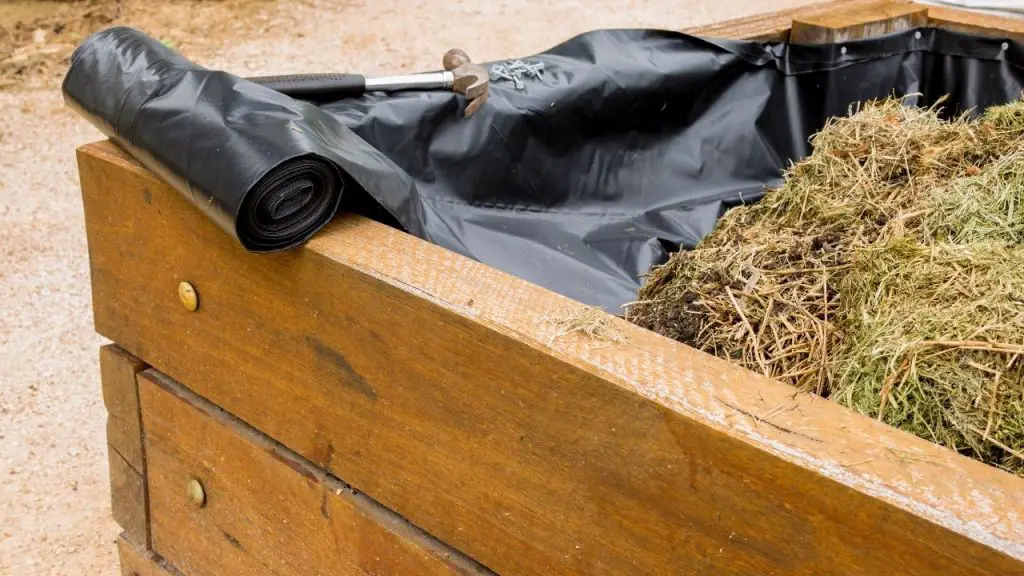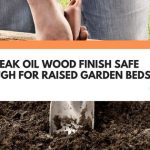The safest garden raised beds are made from untreated wood. Free of harmful chemical preservatives, untreated wood won’t leech toxins into your fruit and veg.
However, this comes at a cost. Those wood preservatives are there to stop wood rot and bugs from eating away at raw lumber. And, without those chemicals, natural pine wood isn’t long for this world.
But, what if you want to make a raised bed from untreated wood? And what can you do to protect a raised bed from all-weather?
Well in this post, you will learn what untreated wood is, (and why this wood is so vulnerable to rot). You will also find out if natural pine wood is durable enough to be left outside.
And we reveal which eco-friendly wood sealer is safe to use on an untreated pine wood garden bed.

This post may contain affiliate links to products that we receive a commission for (at no additional cost to you). Learn more here.
What Is Untreated Wood Exactly?
Untreated wood is wood that does not have wood preservatives in it. In short, this is wood in its raw natural form.
Treated wood, on the other hand, refers to wood that’s been infused with rot-resistant chemicals. These chemicals act like a fungicide, fighting off bacteria before it has a chance to thrive.
This treatment is a key step to protecting any outdoor timber. Without a treatment, any wood placed outside will eventually succumb to decay.
Related Post: Rotting Wood Around Your Sink? 3 Ways To Protect That Wooden Worktop
And Can You Use Untreated Wood For Raised Beds?
You can, there is nothing stopping you. Especially if you use a wood that is naturally rot-resistant.
You see, all wood will decay away eventually (if left unsealed and untreated). However, certain types of wood are more stable and durable than others.
For example, Douglas Fir is a stable timber that doesn’t warp, (even if drenched by rainwater).
While Rosewood, (a tropical hardwood often used for decking), has a lot of natural tree oil in its wood grain. So much so, that it’s tree oils prevent water from being absorbed into the wood fiber of this lumber. This, in turn, makes Rosewood very rot-resistant.
In other words, Rosewood won’t rot easily like other woods might. And if you want to discover more on Rosewood’s incredible water-resisting skills, check out our post here: Should You Really Use Rosewood To Make A Cutting Board?
So How Long Does Untreated Wood Last Outside?
It very much depends on your selection of lumber. Durable woods, like Teak or White Oak, can naturally resist rot and bugs for over a decade—without any treatments.
That’s why, if you were to use a durable timber for your raised bed, you can leave it untreated.
Yet, if your choice of wood is one that does not have any natural rot-resistance, the opposite is true. Leave these non-durable wood types untreated, and they will rot away in a few years if left outside.
Is Pine Durable? Can You Make Raised Garden Beds From Pine?
Well, pine is a fairly strong softwood that is widely used to make furniture, paneling and window frames. But, it is very much an ‘interior’ wood choice.
That is because Pine doesn’t have much rot-resistance. If left untreated, a pine wood raised garden bed will fall apart within 3-5 years.
Basically, unlike say Cedar or Teak wood, Pine wood needs to be sealed and waterproofed.
How Long Will Untreated Pine Last In A Raised Garden Bed? Without wood preservatives or a waterproof sealant, untreated pine will succumb to wood rot within 5 years. And if you live in a rainy climate, it won’t last much beyond 3 years.
But I Really Love The Look of Pine! How Do I Keep My Untreated Pine Wood Bed From Rotting?
There are two simple things you can do to give untreated pine wood a fighting chance in the great outdoors.
Tip 1. Seal Untreated Pine Wood With A Wood Sealer
Wood sealers do exactly what their name suggests…they seal up wood. Used to protect wood from water and moisture, they act as a water-resistant coat on the surface.
Wood sealers are rarely 100% waterproof though. Instead, they will tend to be a microporous material, which means that wood sealers still allow vapor to pass through.
This is key in allowing wood to ‘breathe’, releasing any of its remaining moisture content.
What Is Moisture Content? Moisture Content refers to the percentage of moisture/water in a piece of wood. Freshly cut lumber has a moisture content of 100% on the day its sawed. While KDAT (Kiln Dried After Treatment) wood from the lumber yard, will have a moisture content of 19% or less.
Now, wood sealers are typically filled with a bunch of chemicals you won’t want near your plants. So, it’s important to use a plant-safe wood sealer to protect untreated pine.
Which is why Seal It Garden Bed Wood Sealer is the perfect finish for any raised bed timber.
This eco-friendly sealant doesn’t contain any solvents, sulphate’s, or toxic metals. And, once applied, it will go on to protect wood for over 10 years.
Tip 2. Line The Garden Bed With Plastic Sheeting
Line the bottom of the garden bed with a thick plastic sheet. This will prevent pine from having direct contact with the ground.

The aim here is to stop untreated pine from having constant contact with all of that damp soil.
And plastic sheeting, (plus a garden-safe wood sealer), is your best bet at stopping pine from rotting away quickly.
Can’t I Use Spar Urethane On Pine Instead?
It’s true that Spar Urethane’s great for protecting wood that sees a lot of weather. Nevertheless, you should probably steer clear of using it on garden beds.
The reason is that spar urethane has extra chemical waterproofing ingredients that help it stand up to rain, snow, and moisture. Perfect for sealing a deck or boat! But those same ingredients could leach into the soil which we don’t want near our plants.
So, stick to a plant-safe wood sealer made specifically for garden beds. That way you get the protection without worrying about chemicals getting into the soil. But if you do want to learn more about using spar urethane on pine, we have a whole post about it here you can check out: Can You Use Spar Urethane Sealer On Outdoor Pine Wood?
To Sum Up, Here Are The 3 Key Takeaways From This Post…
- 1). Untreated wood does not contain any rot-resistant wood preservatives. This can leave untreated wood very vulnerable to decay and bugs.
- 2). Pine wood is not a naturally rot-resistant wood. So, untreated pine wood will need a wood sealer if it is to be used on a raised bed.
- 3). Line the bottom of the raised bed with plastic sheeting. This is to prevent untreated pine from having full and constant contact with damp soil.
References:
Björdal, Charlotte Gjelstrup, and Thomas Nilsson. “Reburial of shipwrecks in marine sediments: a long-term study on wood degradation.” Journal of Archaeological Science 35.4 (2008): 862-872.



